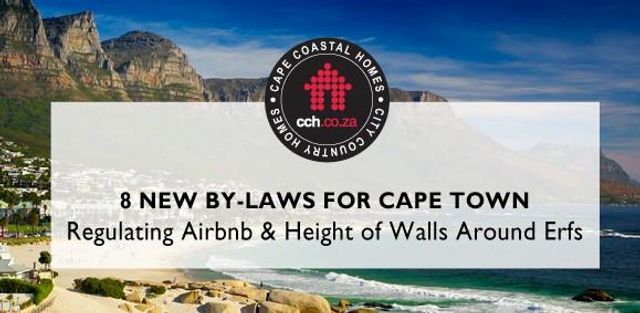8 New By-Laws For Cape Town - Regulating Airbnb & Height of Walls Around Erfs
The City of Cape Town is encouraging residents to attend information sessions on a number of new by-laws which could have far-reaching consequences.
Some of these amendments pertain to emergency housing, the installation of minor freestanding cell masts, a third dwelling as an additional use right, and short-term letting from flats, among others.
It is therefore important that as many interested parties as possible, from residents to rate payers' associations and body corporates, submit their comments on the City's proposed amendments by 1 April 2019, the City said.
"We will host another three information sessions in Fish Hoek, Goodwood, and Strand next week," said the city's Marian Nieuwoudt
"Officials will give a presentation about the impact and consequences of the proposed amendments and those attending will have the opportunity to ask questions.
"I know this topic sounds complicated and that some people would rather avoid it. This is exactly why I'm urging residents to please make an effort to attend these sessions so that officials can explain what we're proposing."
The full set of proposed amendments and the guideline document with more information are available at the 24 sub-council offices and on the City's website.
Alternatively, you can find a breakdown of some of the proposed amendments below.
- Amendments to the emergency housing provisions will enable the City to provide temporary housing on land that may not be zoned for such purpose for a period of six months without needing to undertake a public participation process beforehand. The proposed amendment will allow for families that are left homeless due to emergencies such as fires and floods to be temporarily relocated to an alternative site in a timeous manner.
- New provisions will control the height and permeation of standard boundary walls.
- The City is proposing an additional level to measure height. Height is a contentious issue on sites and in areas with steep slopes and most complaints relate to the impact of height on neighbouring views, privacy, and sunlight. The intention is to, in the end, produce a ground level map that will cover all sites and land in Cape Town so that there is certainty in terms of the allowed height for each and every site/property across the city.
- A new provision that allows for short-term letting from a house or flat for a period not exceeding 30 consecutive days. This is in response to the increase in short-term letting via online platforms such as AirBnB.
- Amendments are proposed to allow for the installation of minor freestanding cell masts (of less than 12 metres in height) on properties such as churches, schools, clinics and hospitals. This means that these minor freestanding masts and minor rooftop masts can be installed at or on these sites without prior land use approval from the City or adjacent landowners. Building plan approvals may still be required.
- A minor rooftop cell mast of less than 1.5 meters in height is allowed as a consent use for properties zoned as single residential 1 and single residential 2; as well as for properties zoned as general residential 1 - 6. This means that the owner of the property must still apply to the City for permission to install this structure.
- An amendment that will allow the City to also use email to correspond with those who comment or object to development applications.
- An amendment that states that no more than one staff quarters is permitted on a land unit without the City's consent. This is to allow the City to consider the legitimacy of domestic staff quarters and the impact it may have on neighbours.
Author Business Tech

